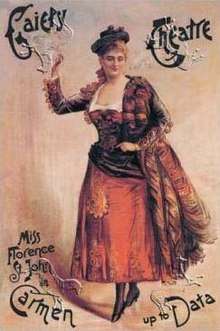Carmen up to Data
Carmen up to Data is a musical burlesque with a score written by Meyer Lutz. The piece was a spoof of Bizet's 1875 opera Carmen. The libretto was written by G. R. Sims and Henry Pettitt.
| Carmen up to Data | |
|---|---|
 Florence St. John in the title role | |
| Music | Meyer Lutz |
| Lyrics | G. R. Sims Henry Pettitt |
| Book | G. R. Sims Henry Pettitt |
| Productions | 1890 West End |
After a tryout in Liverpool in September 1890, the piece premiered at the Gaiety Theatre, London, on 4 October 1890, produced by George Edwardes.[1] It starred Florence St. John in the title role, Letty Lind as Mercedes, Jenny Dawson as Escamillo, Maria Jones as Michaela, Blanche Massey as Morales, Horace Mills as Remendado, E. J. Lonnen as José and Arthur Williams as Captain Zuniga.[2]
The piece was a success and toured throughout the English-speaking world, reaching Australia by 1892.[3]
Background
Bizet's Carmen had first been produced in English in London in 1878 at Her Majesty's Theatre, starring Selina Dolaro and Durward Lely. An earlier burlesque of Carmen, called Carmen: or, Sold for a Song, by Robert Reece, had also been produced at the Folly Theatre in 1879, and several other burlesques followed.[4] Burlesque of opera or classical works was popular in Britain from the 1860s to the 1880s. Other examples at the Gaiety include The Bohemian G-yurl and the Unapproachable Pole (1877), Blue Beard (1882), Ariel (1883, by F. C. Burnand), Galatea, or Pygmalion Reversed (1883), Little Jack Sheppard (1885), Monte Cristo Jr. (1886), Miss Esmeralda (1887), Frankenstein, or The Vampire's Victim (1887), Mazeppa, Faust up to Date (1888), Ruy Blas and the Blasé Roué (1888), Cinder Ellen up too Late (1891), and Don Juan (1892, with lyrics by Adrian Ross).[2] The piece was produced two years after the theatre's Faust up to Date. In the December 1890 issue of Punch magazine, the reviewer wrote, "In calling their burlesque Carmen up to Data possibly the two dear clever boys who wrote it intended some crypto-jocosity of which the hidden meaning is known only to the initiated in these sublime mysteries. Why 'Data'? On the other hand, 'Why not?' However attractive or not as a heading in a bill of the play, the Gaiety Carmen is, on the whole, a merry, bright, and light burlesque-ish piece."[5]
John Hollingshead managed the Gaiety Theatre from 1868 to 1886 as a venue for variety, continental operetta, light comedy, and numerous musical burlesques composed or arranged by the theatre's music director, Wilhelm Meyer Lutz. Hollingshead called himself a "licensed dealer in legs, short skirts, French adaptations, Shakespeare, taste and musical glasses."[6] In 1886, Hollingshead ceded the management of the theatre to George Edwardes, whom he had hired in 1885. Edwardes expanded the burlesque format from one act to full-length pieces with original music by Lutz, instead of scores compiled from popular tunes, and choreography by the theatre's dance-master, John D'Auban.[7] Nellie Farren, as the theatre's "principal boy," and Fred Leslie starred at the Gaiety for over 20 years. Leslie wrote many of its pieces under his pseudonym, "A. C. Torr".[8] In the early 1890s, as Burlesque went out of fashion, Edwardes changed the focus of the theatre from musical burlesque to the new genre of Edwardian musical comedy.[9]
References
- Adams, William Davenport. A dictionary of the drama (1904) Chatto & Windus
- Hollingshead, John. Good Old Gaiety: An Historiette & Remembrance (1903) London: Gaiety Theatre Co
Notes
- Adams, p. 255
- Programme for Carmen up to Data Archived 2008-12-10 at the Wayback Machine
- "Theatre in Melbourne 1892" Archived 2009-02-16 at the Wayback Machine, Mel Moratti's Gilbert and Sullivan Down Under site
- Adams, pp. 254–55
- "Carmen Up To Data, a Souvenir of the Gaiety Theater" Archived January 18, 2008, at the Wayback Machine, Grey Heron Prints
- Arthur Lloyd Music Hall site (on Gaiety) Cuttings Archived 2009-02-12 at the Wayback Machine accessed 01 Mar 2007
- "Theatrical Humour in the Seventies", The Times, 20 February 1914, p. 9, col. D
- Stewart, Maurice. 'The spark that lit the bonfire', in Gilbert and Sullivan News (London) Spring 2003.
- Ganzl, Kurt, "Musicals", London: Carlton (1995), p. 56 ISBN 0-7475-2381-9; Hyman, Alan, "The Gaiety Years", London: Cassell (1975), p. 64 ISBN 0-304-29372-5